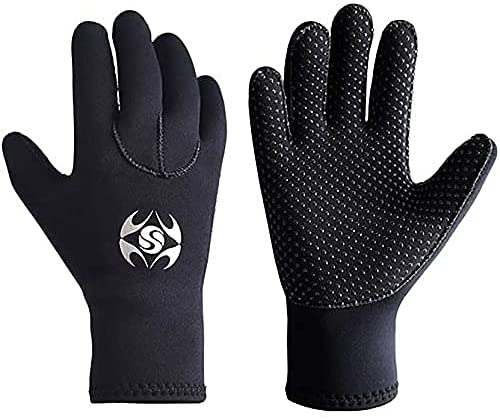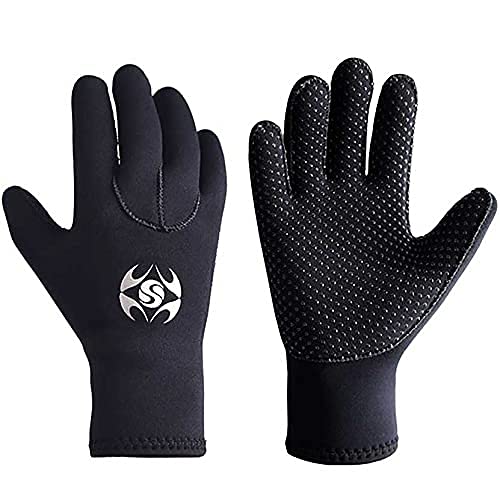There are many rubber gloves out there in the market, and neoprene is one of them – however, it’s a synthetic rubber, not natural rubber. Since these gloves are used to make scuba diving suits, it’s obvious that people would want to know if neoprene is good for gloves.
Although nitrile is the more popular variety, neoprene is equally good for gloves for specific jobs and purposes. Neoprene is one of the best weather-resistant materials and that is why it is a popular choice for making gloves.
Neoprene gloves find the best use in diving, heavy-duty machinery work, laboratories, printing presses, oil refineries, and handling organic chemicals and pesticides. In short, neoprene is good for gloves whenever oils, acids, and grease are involved.

Neoprene is also good for gloves in the sense that they offer an astonishing firm grip. Besides, since they’re latex-free, they’re also excellent options for people who are allergic to latex.
There are many myths and facts that revolve around neoprene gloves. People want to know if neoprene is REALLY good for making gloves, but that’s not it.
As a buyer, you should make an informed decision about whether or not neoprene gloves offer the features you’re looking for. And that’s what this guide is all about.
Expect to learn a lot about neoprene – is neoprene good for gloves and why, what are the myths and facts that you should know about neoprene, the many advantages and possible shortcomings of neoprene, some of the best neoprene gloves, and much more.
Is Neoprene Good For Gloves – Where is it Used the Most?
Neoprene is synthesized rubber – it’s man-made. Since neoprene is made using the polymerization process, it’s extremely resilient to a lot of work hazards that include abrasion, cuts, acids, impact, and heat.
The kind of benefits that neoprene offers make it a wonderful choice for gloves. Neoprene gloves are highly weather-resistant: that’s their biggest strength. The very fact that they’re used for making wet suits indicates that they are designed to keep you warm even when dealing with water.
Neoprene gloves repel most organic acids and toxins. Hence, they’re extremely preferred by lab workers, farmers handling pesticides, and sanitation workers. Since these gloves are highly elastic, they adhere to the shape and size of hands and offer snug-fitting.
It’s their elasticity that makes them dexterous. They won’t interfere with your hands. They’re so light and offer the freedom of movement that you’ll literally forget that you’re wearing them.
Now that you know that neoprene is indeed good for gloves and a few jobs they can be used at, we’d like to help you explore the long list of jobs where neoprene gloves are the best options. Have a look!
1.) They’re used by bikers and motorcyclists.
2.) They’re used by scuba divers.
3.) They’re used by kayakers.
4.) Workers in oil refineries use neoprene gloves.
5.) They’re used by Physicians, dentists, and laboratory staff.
6.) They’re used for farming and handling slippery substances/surfaces.
4 Myths and Facts You Should Know About Neoprene
#1 Neoprene is Waterproof – It’s a Myth
Since it is made to manufacture wetsuits and highly recommended when it’s raining, people assume that neoprene is waterproof – but it isn’t. Neoprene keeps the body warm when you’re exposed to water and that’s why it’s used to make wetsuits.
Neoprene gloves will not protect your hands from water unless they’re coated with some waterproof fabric. What they will do is to make sure that your hands do not get cold or numb when water seeps inside.
See also: Best Waterproof Work Gloves for All Weather Condition
#2 Neoprene is Good for Cold Weather – It’s a Myth
Since neoprene gloves keep the hands warm when they’re exposed to water, it’s assumed that they will be perfect for cold weather.
But that’s not the case. Traditional Neoprene will become stiff under 60 degrees F. Anything below 0 will make your hands cold in neoprene gloves too.
#3 Neoprene is Extremely Stretchable – It’s a Fact
One of the reasons that neoprene gloves are true to their size and slide on your hands like a second skin is because they’re extremely stretchable.
What’s even better is the fact that they will also come back to their original size and shape when you take them off.
#4 Neoprene Resists Organic Acids – It’s a Fact
The primary reason neoprene is even considered as an option in laboratories is that it resists organic acids and alcohol. You might be wondering that if water can seep inside why not acids.
Well, the answer to this question is that neoprene is actually chemically-treated while it’s being manufactured. Hence, it resists chemicals in general.
It also resists fire and flame, ozone, oil and soot, and grease. Whenever the conditions are slippery and you just cannot afford to lose your grip on whatever you’re holding, neoprene is your material.
Advantages and Disadvantages of Neoprene Gloves
Every coin has two sides and so do materials and fabrics – neoprene is no different. It has pros as well as cons. In the upcoming sections, we will take you through both, the advantages and disadvantages of neoprene gloves.
6 Advantages of Neoprene Gloves
1.) Neoprene gloves offer a grip that’s better than most other materials – When you’re a scuba diver or you have to hold greasy objects or sharp tools while you’re working, if there’s one material that you can count on, then that’s neoprene.
Even if your hands are fully soaked in water and you’re driving a motorbike, the grip will still be fantastic.
2.) Neoprene gloves will be like a second skin – They’re so stretchable and so elastic and dexterous that as soon as you wear them, they snugly hug you back. They won’t constrict your fingers and won’t affect your work efficiency whatsoever.
3.) Neoprene Gloves Will Protect Your Hands From Chemicals – Toxins from contaminants and organic acids cannot go past the layer of neoprene. They are highly chemical-resistant and they offer a pretty decent protection from petroleum-based products too.
4.) Neoprene Gloves are Resistant to Abrasion – Neoprene gloves are highly abrasion-resistant. You can wear them while pulling out weeds, dealing with thorny bushes, holding sharp objects, they won’t puncture.
Naturally, they will protect your hands from getting wounded. You can use them for hours and they still won’t tear apart easily. They’re built to last.
5.) Neoprene Gloves are Affordable – After all the benefits that neoprene gloves offer, you might assume that they would be very expensive, but they’re not.
Neoprene gloves are quite affordable options. The best thing is that since they are reusable. In short, they’re one-time investments.
6.) Neoprene Gloves are Free of Latex – Latex quite commonly can cause allergies and may lead to hand dermatitis. Since neoprene doesn’t not have latex, they do not cause allergies either. Hence, they’re economical options for people who have latex allergies.
3 Disadvantages of Neoprene Gloves
1.) Neoprene gloves do not protect hands from oxidizing acids.
2.) Neoprene cannot be used as a protection against electrical hazards since it absorbs water.
3.) Neoprene gloves take a lot of time to dry once they’re wet.
3 Neoprene gloves You Should Buy
1.) XUKER Water (3mm & 5mm) Neoprene Gloves
- Perfect Hands Protection - These neoprene gloves are glued blind stitched, strong but flexible, provide perfect protection for your hands in multiple water sports, keep your hands safe against any dangerous objects or creatures.
- Keep Hands Warm - The diving gloves are made from premium neoprene which is thermal and covered with soft elastic fabric, continuously keep your hands warm in water and winter sports.
- Great Palm Grip - With the anti-slip rubber printed palms neoprene gloves, you can be confident that you will never lose your grip while snorkeling, surfing, swimming, sailing, diving, kayaking, rafting, canoeing, boating or other aquatic activities.
Prices pulled from the Amazon Product Advertising API on:
Product prices and availability are accurate as of the date/time indicated and are subject to change. Any price and availability information displayed on [relevant Amazon Site(s), as applicable] at the time of purchase will apply to the purchase of this product.
These five finger neoprene gloves are excellent for scuba diving, Snorkeling, and Surfing. They’re also excellent biking gloves. Some of the advanced features of these neoprene gloves are as follows.
1.) They’re resistant to sunlight and UV rays. This will protect your hands.
2.) They’re ambidextrous. No matter which one’s your working hand, these gloves will fit like a dream.
3.) They have a hook and loop wrist closure that adds to the comfort.
4.) They’re very strong but very flexible and very elastic at the same time.
5.) They offer a very strong grip no matter how slippery or wet things/surfaces are.
Cons: Some buyers complain about the gloves being smaller. However, if you’ll buy the size according to the size chart provided by the manufacturer, you’ll most probably find the right fit.
Check Price and Reviews on Amazon2.) SLINX S Wetsuit Thermal Neoprene Gloves
- S—palm width: 7-8cm. Measuring tolerance ±1cm is allowed due to elastic materials.
- These neoprene gloves’ glued and blind stitching can slow down water leaking into it and enhance its durability.
- Anti-slip design on palm to help increase friction
Prices pulled from the Amazon Product Advertising API on:
Product prices and availability are accurate as of the date/time indicated and are subject to change. Any price and availability information displayed on [relevant Amazon Site(s), as applicable] at the time of purchase will apply to the purchase of this product.
These unisex neoprene gloves are perfect for bikers. They offer insulation when cold water from the rain seeps inside the gloves so that your hands stay warm. Some of the better advantages that have put these gloves in our list of top 3 neoprene gloves are mentioned in the pointers listed below.
1.) They’re eco-friendly and offer a greater level of thermal insulation.
2.) They’re a blend of both neoprene and nylon. Hence, they won’t absorb water to a very great degree. Hence, in light rain, water might not even get inside the gloves.
3.) They’re flexible and the palms are made immensely resistant to slipping. They offer a very sturdy grip of the handle.
Cons: Buyers complain that these gloves do not help while spearfishing. However, the manufacturer already has made a mention of the fact that these are not spearfishing gloves.
Check Price and Reviews on Amazon3.) Chemical Resistant Neoprene Gloves by D Super Remover
- SECURE: Anti-skid grip for wet or dry projects on the outside
- COMFORTABLE: Knitted cotton liner on the inside for an easy to remove and reuse work glove
- TOUGH: Ultra-strong design, durable and reusable for other painting and stripping projects you might have
Prices pulled from the Amazon Product Advertising API on:
Product prices and availability are accurate as of the date/time indicated and are subject to change. Any price and availability information displayed on [relevant Amazon Site(s), as applicable] at the time of purchase will apply to the purchase of this product.
These are industrial-grade neoprene gloves for professionals working in industries that involve contact with organic acids. Some of the best features that make these gloves safe to use when dealing with acids and alcohol are as follows.
1.) The inside of the gloves feature a knitted cotton lining. It aids the purpose of quickly removing and wearing the gloves.
2.) The cotton lining also helps in wicking away beads of sweat.
3.) You get the best of both worlds: They’re anti-skid gloves with real rubber used around the palms and the sleeves are fully neoprene.
Check Price and Reviews on AmazonConcluding Thoughts:
Neoprene is a very good option for gloves. Neoprene gloves are highly stretchable and elastic. They’re preferred when working with pesticides, organic acids, oils, alcohol, and grease. The grip of neoprene gloves is unparalleled. Plus, they’re reusable. Hence, they’re economical too.
Neoprene gloves come with their own set of advantages and disadvantages. One of the disadvantages is that neoprene gloves take a long time before they are completely dry.
The most crucial thing you ought to know before you actually invest in a pair of neoprene gloves is that these gloves are not waterproof. They are designed to keep your hands warm even when water gets inside the gloves.
Always remember, you can buy neoprene gloves that are blended with cotton or nylon for even better performance. We hope that with this guide you will finally be able to make an informed decision on whether or not neoprene gloves are suitable for you.











